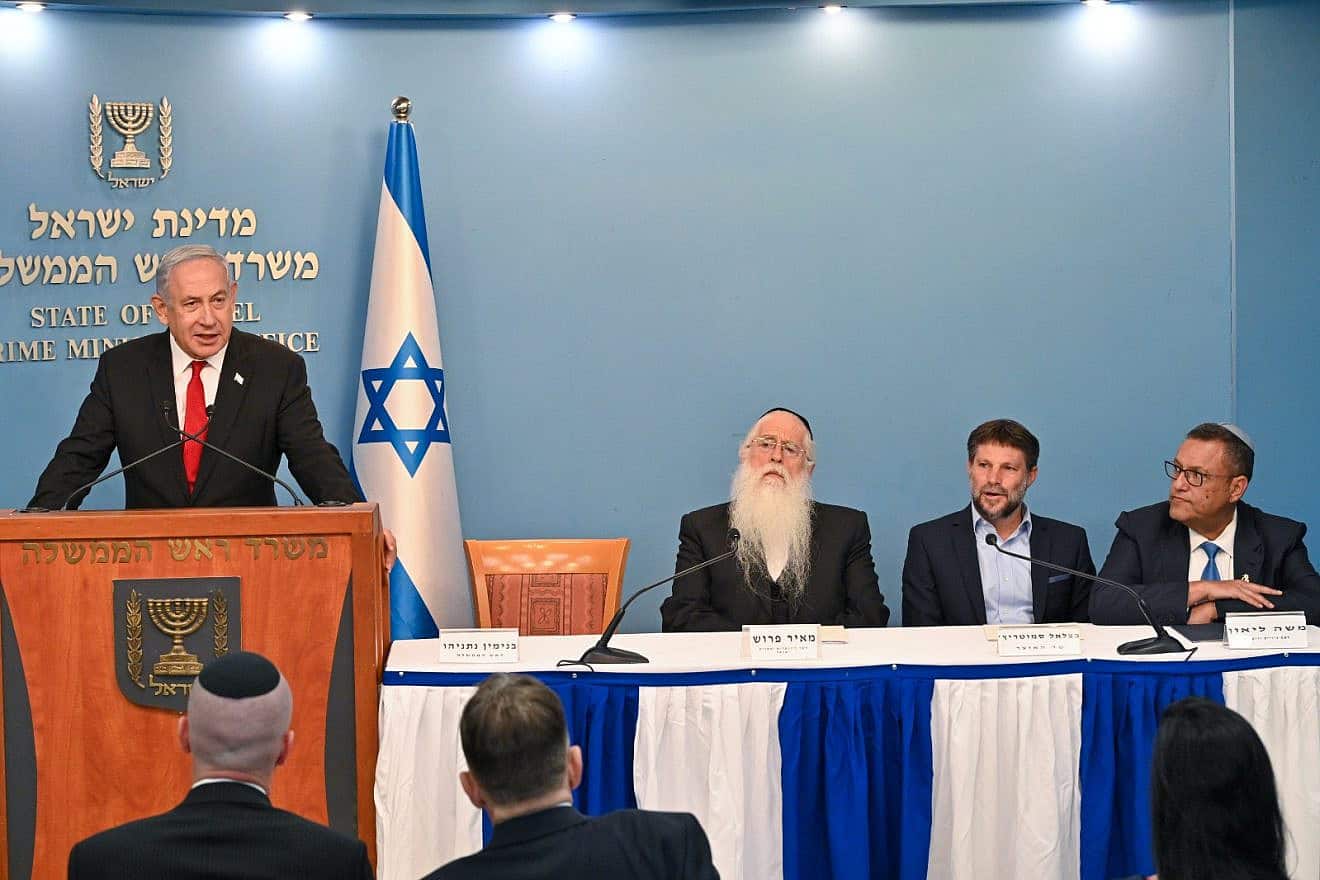by JNS
"We are building Jerusalem, strengthening the governance and uniting Jerusalem," Netanyahu said.
 |
Prime
Minister Benjamin Netanyahu speaks at the joint announcement of a
five-year investment plan for eastern Jerusalem, Aug. 20, 2023. Photo by
Kobi Gideon/GPO.
Faceboo |
The Israeli government on Sunday approved a five-year, 3.2 billion shekel ($843 million) plan to invest in the residents of eastern Jerusalem.
Following the Cabinet meeting, Prime Minister Benjamin Netanyahu presented the program to reduce economic and social disparities in the eastern section of Israel’s capital city.
“We brought a decision in favor of the residents of east Jerusalem. A decision that will change the face of the city of Jerusalem, that will bring about a massive development of infrastructure, health, welfare, personal security, employment and an increase in the number of entitled to [high school] matriculation certificates,” Netanyahu said.
“We are building Jerusalem, strengthening the governance and uniting Jerusalem,” the premier continued.
The plan will also address areas such as economic development, public transportation projects, energy and electricity, sewage, sustainability, culture, community affairs and recreation and local initiatives, according to the Prime Minister’s Office.
“The government has determined that the Jerusalem Affairs and Jewish Tradition Ministry will be responsible for the overall management of, and integration of operations for, the implementation of the plan for the decision as a whole,” said a PMO statement.
The ministry will report to the Cabinet on the implementation of the plan once a year, close to Jerusalem Day.
Also speaking at the live-streamed event on Sunday were Finance Minister Bezalel Smotrich, Minister of Jerusalem and Israel’s Tradition Meir Porush and Jerusalem Mayor Moshe Lion.
Porush presented the plan for the years 2024-2028 at the Cabinet meeting.
“The government is investing in the Arab population, not because the investment in it will be expressed by adding numbers [of Knesset members] to the coalition, as was the case in the previous government. We are investing billions in them because it is the most humane thing to do, and we do it with all our will and with all our hearts,” Porush said.
In addition, the government approved approximately 1 billion shekels ($263.5 million) for transportation projects in eastern Jerusalem, including the Eastern Ring Road to connect Israeli communities south of the city in the Bethlehem area to Israeli communities in the Ma’ale Adumim area, east of the capital.
National Security Minister Itamar Ben-Gvir voiced opposition to the eastern Jerusalem investment during the Cabinet meeting, saying that “we need to make sure that the money does not just go but goes to the right places. I’m very upset that money will go to the wrong districts and places that will misuse it.”
Smotrich had earlier frozen funds intended to help integrate eastern Jerusalem residents into Israeli universities, but he later agreed to release the money.
“The national camp governments were the ones that invested and will invest the most. We want to do it right. We want to make sure that these budgets reach their intended destination and not for other purposes, whether criminal elements, involvement of terrorism, incitement and violence. The state closed its eyes on this matter. Now we are putting an end to it,” Smotrich said.
The finance minister recently came under fire for delaying the transfer of a separate 200 million shekels ($53 million) earmarked for Arab municipalities across Israel, which had been promised under the previous government by then-Interior Minister Ayelet Shaked to coalition partner Mansour Abbas, head of the Ra’am (United Arab List) Party.
“There are more urgent and important needs than continuing to transfer political funds for the Ra’am Party,” Smotrich said.
There’s “no justification” for giving Arab municipalities special grants, he added, as they already receive the same funds as other economically depressed municipalities.
Smotrich also said that the budgets “often go to criminal and terrorist organizations” that dominate the bidding process for projects in Arab areas. “As you no doubt know, so far there is no mechanism in place to track these bids,” he said.
Nevertheless, Netanyahu promised earlier this month that the extra funding would indeed be transferred with proper oversight, “pursuant to an evaluation and supervision that they will be used for their designated purpose—for the benefit of Israel’s Arab citizens and nothing else.”
Meanwhile, Smotrich and National Missions Minister Orit Strock are spearheading a 670 million shekel ($180 million) initiative with the stated goal of strengthening “civilian resilience” in Jewish communities across Judea and Samaria.
The “unprecedented” addition to the 2023-2024 budget, parts of which were already agreed upon in the coalition agreement with Smotrich’s Religious Zionism Party, is meant to assist communities living under the threat of Palestinian terrorism.
Accordingly, 46.5 million shekels ($12.4 million) will be invested in building “resilience centers” and social programs.
Smotrich and Strock are also seeking to encourage demographic growth in more remote parts of Judea and Samaria by earmarking more than 100 million shekels ($26.7 million) for northern Samaria, the South Hebron Hills, Kiryat Arba and the areas around the Dead Sea and the Jordan Valley.
More than 200 million shekels ($53 million) will be used to upgrade outdated infrastructure, schools and public buildings, including in “unregulated” outposts, while a budget of 184 million shekels ($49.1 million) is set aside to boost the security of Jewish communities under threat.
JNS
Source: https://www.jns.org/israel-news/eastern-jerusalem/23/8/20/311833/
No comments:
Post a Comment